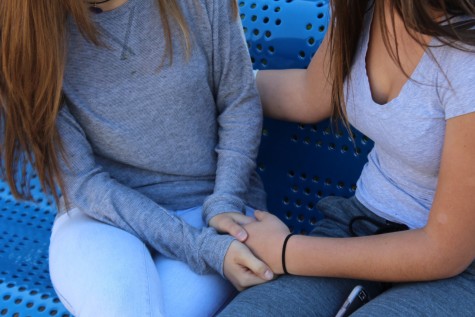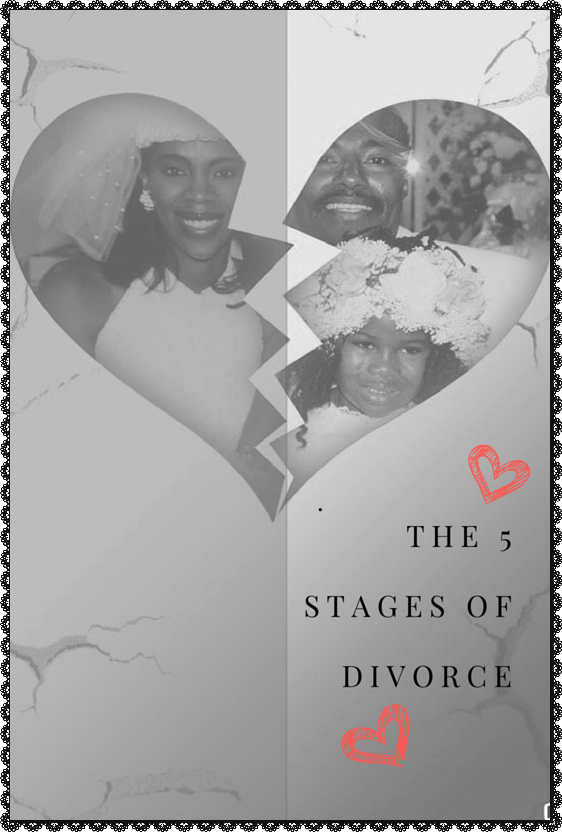Divorce: How to deal, how to heal
Sophomore Sophia Praino reflects upon a common emotional trauma, her parents’ divorce.
December 18, 2015
My heart broke the day my mom told me she did not love my dad anymore. As a young child, I pictured my parents as soulmates, looking through their wedding albums while smiling at the unstoppable joy in their eyes.
It was June, and without a cloud in the sky on a scorching hot day, my mom told me she would only stay married to my dad for me. She explained to me how the love and care they felt for one another had vanished. According to The New York Times in early 2015, the divorce rate continues to persist, though not as terribly as the 1970s and 1980s, hovering around the still shocking 46% rate of all marriages ending in divorce.
The D word strikes fear.
“When my parents first separated, I remember my mom telling me I threw constant tantrums. Sometimes she said it got so bad because she couldn’t control me, but I was so young I don’t really remember,” junior Jalen Hunt said.

Relying on friends who can relate to this deeply difficult situation results in open communication and better outcomes.
Divorce impacts in a teen’s life in a vast way and affects their social cognition and relationships. Social cognition focuses on a person’s ability to process, store, and apply information about other people and social situations, explaining why teens worry about the impressions and signals they send to other people and how they interpret those signals. The trauma of parental divorce intensifies the child’s dependence and accelerates the teenager’s quest for independence.
The National Affairs, a public interest journal, reports that since the early 70’s one million children a year witness a parent divorce. Many of these teens attest to the trauma and monumental stressful reactions which lead to a loss of emotional regulation. Social psychologists observed that children and teens that witnessed their parents’ divorce often lose a degree of control over how they regulate their emotions.
“The combined stress of the divorce and the fear of the unknown is a lot for a child to comprehend what’s going on. I don’t think any child should have to handle it at such a young age,” sophomore Sarah Lamb said.
Timothy Clinton and Ron Hawkins, well-known authors and psychologists, noted that even if parents deal openly with the divorce, factors, negative variables and influences impact how children react, such as the age of the child, his or her maturity level, susceptibility,resilience and the degree of hostility and fighting witnessed. Both researchers noted that boys experience a great deal of anger and aggressive behavior. On the other hand, girls observed showed signs of being better to verbalize their anxieties but reveal more symptoms of depression and emotional withdrawal.
“My parents were argumentative and very distant from each other. They tried to hide what was going on, but we all knew it was about me and my siblings,” sophomore Sara Cook said on how her parents behaved during the emotional turmoil.
Dr. Carl Pickhardt, a family therapist, discovered that many divorcing parents hope the trauma of divorce will not have a lasting impact upon their children. But realistically, children having to live with ongoing pain will lead to tensions and unwarranted elevated stress levels.
“The most difficult thing that I experienced was having to go back and forth from house to house, and dealing with my parents’ constant arguing,” sophomore Ariel Hunter said.
Lamb also elaborated on the most difficult experience she faced during the divorce: “Moving the house around and all my stuff when I was only three years old, it was really hard for me to understand.”
The occurrence of divorce occasionally results in the child’s world being turning “upside down and cast into a downward spiral.” The family structure that formerly deemed as a fortress of security, transforms overnight into a source of insecurity. Children and teens are uprooted and may be forced to move away from their schools and compelled to leave their friends behind.
“While learning to live at two different houses, I had to grow up fast living around that. I learned to become more independent because if they weren’t going to focus upon me I had to focus upon myself,” sophomore Sara Cook said.
Damon Verial, author of the article “How Divorce Affects Teens Psychologically and Emotionally,” stated that dealing with distress in a negative, hostile environment is simply human nature. But he added, “Teens who witness their households falling apart feel distraught.”
Dr. Gottman, a relationship psychologist and author of Raising an Emotionally Intelligent Child, recognized that research indicates such psychological changes over time leads to an increased heart rate and elevated blood pressure due to exposure to adult fighting. Dr. Gottman also commented that witnessing such trauma inhibits the child’s ability to focus or cope with future problems, and may develop academic challenges. Research also notes that the trauma of witnessing a difficult divorce increases the risk of children engaging in antisocial behavior.
The Heritage Foundation, a conservative thinktank, reported that children of divorced parents have a higher chance than children of stable, intact families to experience poverty, have health problems, and become a target of abuse and neglect. The children of broken homes prove to have higher dropout rates, an earlier incidence of sexual exploration, and higher rates of drug and alcohol use.
According to Dr. Pickhardt, when divorce occurs during a child’s life, the process itself impedes development, as shown by holding onto secure attachment. In other words, the attachment between a mother and a child feels broken after a trauma like divorce. During adolescence, a teenager breaks the attachment in pursuit of independence.
In addition, teens who experience the trauma of divorce often felt robbed of their childhood.
“To a certain extent I think I was robbed of my childhood because the combined stress of the divorce and fear of the unknown is a lot for a child to deal with. I had to mature faster to be able to comprehend what was going on. I don’t think any child should have to handle such pressure at such an early age,” sophomore Ariel Hunter said.
However, not all children feel that their parents divorce has affected their childhood development, many teens grow up with a wonderful childhood because of the most active parent overcompensating for the other.
“No, I don’t feel robbed of my childhood because my mom even though she was a single parent worked harder to provide me with all the love and normalcy she could deliver,” sophomore Sophia Praino said.
However, in contrast to the negative outcomes of traumatic divorces, some children and teenagers perceive their lives as being better post-divorce and look forward to brighter futures. “They are better off and now they are both happy,” Hunter said.
Children and teens must remind themselves that although it may seem like their world flipped upside down, they should feel no blame or responsibility for the outcome.









